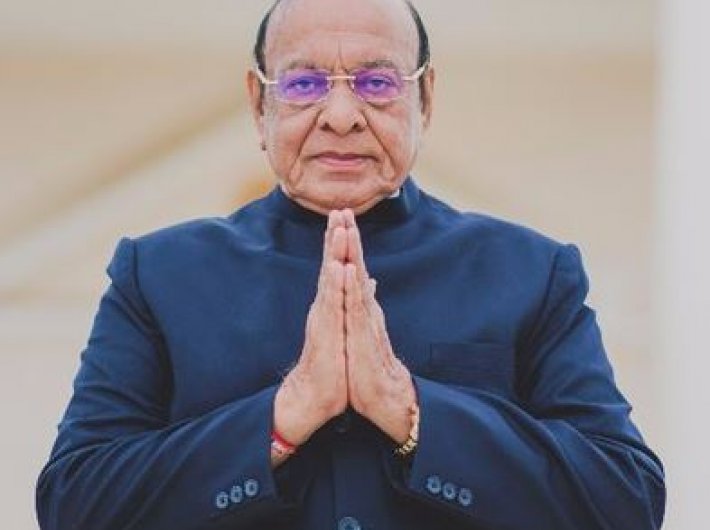The Jai-Veeru friendship of Vaghela and Modi ended decades ago. The completely different paths politics has taken them on is a study in vagaries of luck and timing
Back in the early 1990s, Shankarsinh Vaghela was (or at least perceived to be) more popular of the two people running the BJP show in Gujarat. Today, the other man is the prime minister, and Vaghela is reduced to a footnote – albeit an important one – in the Narendra Modi saga.
On Friday, at a grand meeting in Gandhinagar to celebrate his birthday, Vaghela announced that the Congress had expelled him. (The party has a different version.) This was widely expected, after he gave a series of loud hints in recent months. He was unhappy because of his rivalry within the party with Bharatsinh Solanki, president of the state unit and son of former chief minister Madhavsinh Solanki. For the past couple of decades, the Gujarat Congress has had three to four power centres, each leading a faction of his own. He is now widely expected to return to the BJP. He would, thus, be completing a full circle.
There are two aspects of Vaghela’s story over the last 22 years. One, it contrasts sharply with the rise and rise of his erstwhile friend, Modi. Two, it is the best illustration of the adage that in politics, luck and timing matter above all else.
As the BJP started making its presence felt in Gujarat (in 1984 one of its only two seats in Lok Sabha was from Gujarat, and it won Ahmedabad municipal elections in 1985), Vaghela was its most dynamic leader. Legend has it that he and Modi – both originally from the RSS, and lent to the BJP – were a pair like Jay and Veeru. That fits the image of Vaghela on his Bullet, with Modi pillion-riding, and moving the interior parts of Gujarat on party work. In 1989, Vaghela won the Lok Sabha elections from Gandhinagar (which includes much of Ahmedabad actually), graciously vacating that seat for LK Advani later and turning it into a VVIP constituency for decades. Vaghela thus was the popular face, whereas Modi was the man of the organisation, working behind the scenes.
As the party came to power in the state in 1995, he was a contender for the post of chief minister, but apparently he didn’t contend openly. Modi, the organisational secretary of Gujarat BJP, became the kingmaker and the most veteran leader of the lot, Keshubhai Patel became the chief minister. Vaghela expected at least some fruits of power for his followers but none of them was included in the cabinet. In the following months, Vaghela waited for appointments to state boards and corporations, but nothing came his way. According to one version of the events, Vaghela repeatedly met Advani but Modi was not reined in.
In September 1995, Vaghela led an open rebellion – the first in the ‘cadre-based, disciplined’ party and one of the very few so far, taking 47 MLAs supporting him to a resort in Khajuraho. (The Vaghela faction earned the moniker of ‘Khajuria’, and in response the rest were called ‘Hajuria’ or yes-men.)
The high drama ended with a compromise. Suresh Mehta, soft-speaking finance minister who was not exactly fond of power, became chief minister as neutral candidate. And Modi was banished from Gujarat, to serve the party in Himachal Pradesh and elsewhere in the north. Vaghela’s appetite for power grew in the meanwhile, and he finally broke away from the party (the only other leaders who split BJP later were Uma Bharati and Kalyan Singh). His floated his own outfit, Rashtriya Janata Party, and became chief minister – with the Congress support. This was a period when he could have proved his mettle, and consolidated his power. He could have seized the opportunity – the way Modi did (in 2001 or 2002, depending on your viewpoint). He could not. It has been a downhill journey ever since, which was precipitated when he merged his party with the Congress by the late 1990s.
Yes, as chief minister, he did win from Radhanpur against the collective might of BJP-RSS. Yes, he could put Pravin Togadia behind bars and end the fable that any action against that VHP leader would set the state on fire. Vaghela had guts, and like to be called the lion of Gujarat. The last time that epithet was used was when he challenged Modi in the aftermath of the 2002 riots, with his supporters waving placards saying ‘Bhago Bhago Kaun Aaya, Gujarat ka Sher Aaya’. Like Togadia before him, he too turned out to be a paper tiger.
He failed to turn to his advantage a stint in the union cabinet, as textile minister, during the UPA1. The BJP candidates who defeated him in the Lok Sabha polls in 2009 and 2014 were no longer feted as giant killers. He failed to defeat junior rivals in the Gujarat Congress. In contrast, Modi has not met a challenger who survived in the party.
The two of them share many traits, from mastery in organisation skills to a way with words and down to megalomania, but luck is not one of them. To appreciate Modi’s deft strategies, Vaghela provides the best study in contrast.

